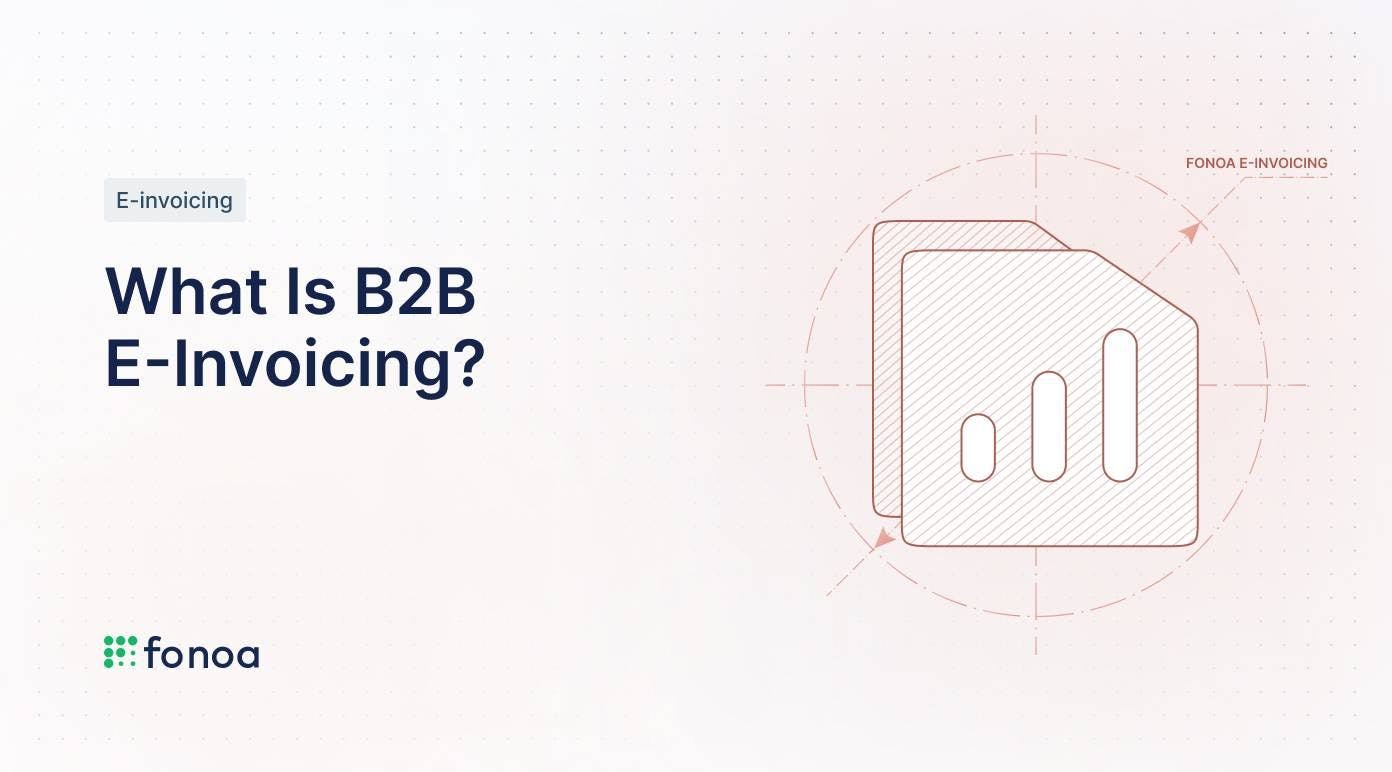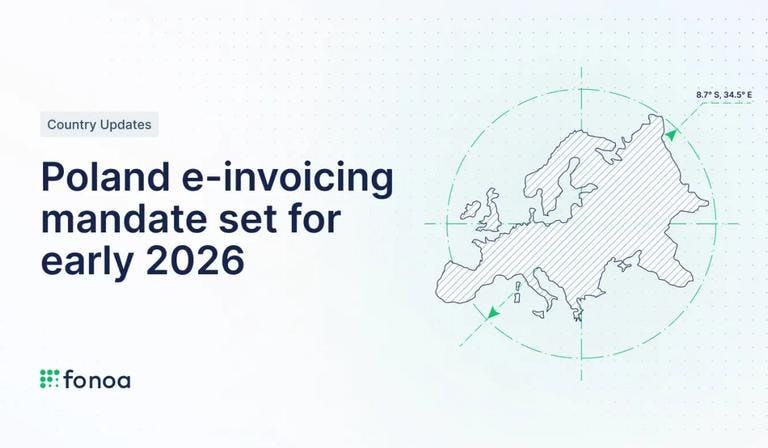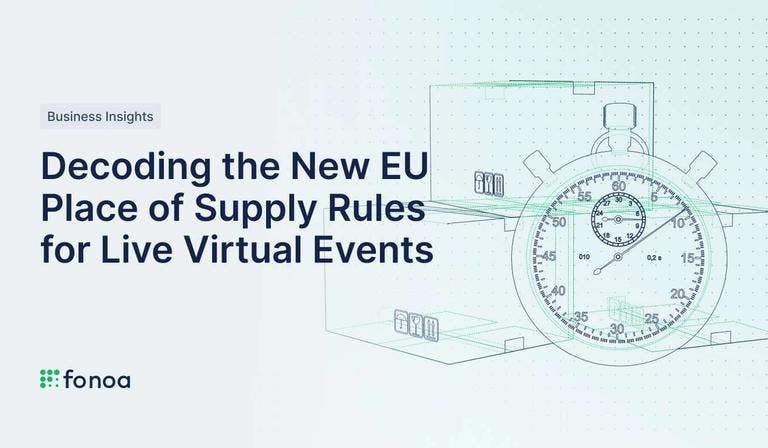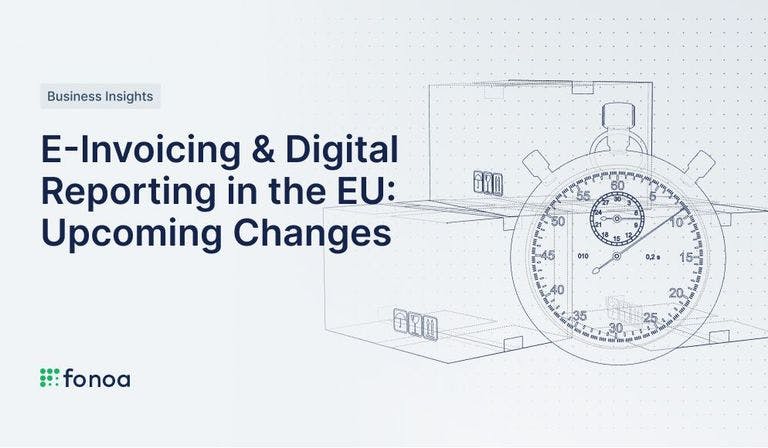What Is B2B E-Invoicing? Definition, Global Mandates & More

B2B e-invoicing, the digital exchange of invoices between businesses, is fundamental for contemporary commerce. With regulations driving its adoption, it streamlines operations and enhances transparency, revolutionizing invoicing practices for businesses in today's regulatory landscape.
This article provides a comprehensive understanding of B2B e-invoicing, emphasizing its significance in modern business transactions and its role in streamlining financial processes. It explores the differences between B2B e-invoicing and traditional methods, highlighting the efficiency and compliance benefits of digital invoicing. Additionally, the article traces the evolution of B2B e-invoicing and delves into European mandates, underscoring the importance of compliance in cross-border transactions. Readers also gain insights into the landscape of B2B e-invoicing in the USA, including relevant regulations and adoption trends. Practical implementation guidance is offered, along with recognition of the crucial role B2B e-invoicing plays in enhancing efficiency, reducing costs, improving accuracy, and ensuring regulatory compliance for businesses today.
What is B2B e-invoicing?
B2B e-invoicing, also known as business-to-business electronic invoicing, encompasses the digital exchange of invoice documents between companies. It's important to note that B2B e-invoicing practices vary worldwide, with different countries implementing diverse regulatory frameworks and technological approaches. For instance, in some countries, businesses are required to submit XML e-invoices to governmental authorities for approval before sending both the XML and PDF versions to the buyer. Alternatively, many countries mandate taxpayers to interact with a central government-owned system, where suppliers upload invoices for buyers to retrieve. Conversely, in other jurisdictions, B2B invoice exchange occurs solely in XML (i.e UBL) format directly between trading parties or their respective billing/procurement systems.
The evolution of B2B e-invoicing reflects a broader shift towards digital transformation in business operations, accelerated by the COVID-19 pandemic and the subsequent adaptation to remote work environments. The pandemic served as a catalyst for businesses worldwide to reassess their operational strategies, leading to a heightened reliance on digital solutions to ensure continuity and efficiency in financial processes. In response to lockdowns and disruptions to traditional business practices, companies increasingly embraced electronic invoicing as the new norm, recognizing its potential to streamline workflows, reduce manual errors, and enhance transparency in financial transactions.
Moreover, the transition towards e-invoicing obligations has been fueled by various benefits it offers to governments. E-invoicing plays a crucial role in curbing indirect tax (i.e. VAT) evasion by providing a real-time digital trail of transactions, enhancing transparency, and minimizing opportunities for fraudulent activities. Additionally, governments leverage e-invoicing to gain deeper insights into the economy, allowing for more accurate tracking of financial flows and economic trends. This data enables policymakers to make informed decisions and implement effective strategies to support businesses, fostering a competitive advantage within the global market.
Additionally, the expansion of electronic invoicing from the public sector into the private sector has been fueled by the recognition of its numerous benefits, including cost savings, faster processing times, and improved cash flow management. As governments worldwide continue to promote digitalization initiatives and implement regulations mandating the use of electronic invoicing and e-reporting of business transactions, the adoption of B2B e-invoicing is expected to become increasingly widespread, reshaping the landscape of commercial transactions and driving further innovation in financial technology (FinTech) solutions.
How does B2B e-invoicing differ from traditional invoicing?
B2B e-invoicing differs significantly from traditional invoicing methods primarily in its digital nature and automated processing functionality. Traditional invoicing involves the manual creation, printing, and mailing of paper invoices between businesses, often resulting in time-consuming processes and increased risk of errors. In contrast, B2B e-invoicing leverages electronic platforms and technologies to streamline the invoicing process. It entails the digital exchange of invoice documents between businesses through electronic means, often through secure pathways such as SFTP or AS4, but also through email or specialized invoicing inboxes.
One key distinction lies in how B2B e-invoicing utilizes automated processing to standardize data formats across different accounting and ERP systems. Unlike traditional invoicing, where invoices may vary in format and structure, e-invoicing employs standardized electronic formats, such as XML or JSON, ensuring consistency and compatibility across various accounting software and systems. This automated approach facilitates seamless integration of invoice data into recipient systems, reducing manual intervention, minimizing errors, and accelerating invoice processing times. Additionally, e-invoicing platforms often offer features such as electronic signatures and validation checks, further enhancing accuracy and compliance with invoicing standards and regulations. Overall, B2B e-invoicing revolutionizes the invoicing process by embracing digital technologies to improve efficiency, accuracy, and interoperability between businesses.
B2B e-invoicing mandates in the EU
In the European Union (EU), B2B e-invoicing is regulated by Directive 2010/45/EU, which sets standards for electronic invoicing and aims to facilitate cross-border trade by harmonizing invoicing practices across member states. To ensure the authenticity of origin and content integrity of e-invoices, three criteria are typically required. Firstly, transactions may be conducted via Electronic Data Interchange (EDI), which facilitates secure and standardized communication between trading partners. Secondly, an advanced electronic signature may be utilized to authenticate the identity of the sender and ensure the integrity of the invoice content. Lastly, internal auditing processes may be employed by businesses to track the entire invoicing process, from creation to receipt, ensuring compliance with regulatory standards.
Italy emerged as a pioneer in the EU by implementing a mandatory e-invoicing system between private companies, in addition to mandating e-invoicing for business-to-government transactions. France has also legislated a B2B e-invoicing model, with French requirements set to take effect from 2026 onward.
Furthermore, various EU member states are moving towards mandatory electronic invoicing to enhance efficiency and compliance. Latvia is in the process of implementing mandatory B2B e-invoicing likely leveraging the Peppol network, while Estonia is expanding its adoption of electronic invoicing. Belgium has already mandated B2B e-invoicing, and Romania is transitioning to issue e-invoices for B2B transactions with European commission authorization, not to mention the elephant in the room Germany who recently publish regulations for mandatory B2B e-invoicing.
These developments underscore the EU members and European commission's commitment to digitalization and standardization in B2B transactions, reflecting a broader global trend towards e-invoicing adoption and regulatory compliance. By staying abreast of these regulatory changes and embracing e-invoicing solutions, businesses can streamline operations, improve compliance, and capitalize on emerging opportunities in the digital economy.
European countries with mandatory B2B e-invoicing in 2024
E-invoicing and digital reporting regulations are popular among the tax authorities in Europe as it helps them to have better visibility over transactions in their economy, thereby empowering them to enforce tax controls more efficiently.
On the other end of the spectrum, taxpayers are challenged by demanding compliance requirements. This challenge is particularly pronounced for international companies that must monitor and adapt to ever-changing rules and regulations in multiple jurisdictions to stay compliant.
We summarized all e-invoicing regulatory changes expected in the EU to help you stay updated with e-invoicing and digital reporting obligations, including VIDA. You can also check our country tax guides for existing e-invoicing rules and details.
B2B e-invoicing in the U.S
In the United States, e-invoicing is not mandatory at either the federal or state level for both business-to-business (B2B) and business-to-government (B2G) relationships. Unlike some countries that have implemented new requirements for the use of electronic invoicing, the U.S. does not have overarching federal legislation mandating e-invoicing for commercial transactions. Similarly, individual states within the U.S. have not enacted laws or regulations that make B2B or B2G e-invoicing obligatory.
Instead, invoicing practices in the U.S. remain largely governed by industry standards, contractual agreements, service providers and individual business preferences. While many businesses in the U.S. have adopted e-invoicing voluntarily due to its numerous benefits, such as improved efficiency, cost savings, and reduced environmental impact, there is no legal requirement for businesses to transition to electronic invoicing, however archiving requirements may differ for electronic invoices vs their paper based predecessors.
As a result, companies operating in the U.S. have the flexibility to choose whether to utilize e-invoicing based on their specific business needs, customer requirements, and industry norms. While e-invoicing adoption continues to grow in the U.S. due to its advantages, its use remains optional and is not mandated by federal or state authorities for either B2B or B2G relationships.
Why is B2B e-invoicing important?
B2B e-invoicing is crucial for businesses due to its ability to streamline the invoicing process, improve efficiency, and provide a competitive edge both locally and globally. Here's why B2B e-invoicing is important and the benefits it offers:
Improved Efficiency: B2B e-invoicing automates manual invoicing processes, reducing the need for paper-based documentation, manual data entry, and physical mailings. This automation leads to faster invoice creation, delivery, and payment processing, resulting in improved operational efficiency and resource utilization.
Competitive Edge: Adopting B2B e-invoicing provides businesses with a competitive advantage locally and globally. By embracing digital invoicing technologies, companies can enhance their responsiveness to customer needs, accelerate cash flow cycles, and establish themselves as innovative and forward-thinking organizations in their respective industries.
Improved Compliance: B2B e-invoicing helps businesses ensure compliance with regulatory requirements and invoicing standards. Electronic invoicing platforms often incorporate built-in validation checks and adherence to legal frameworks, reducing the risk of errors and non-compliance with invoicing regulations.
Risk Mitigation: E-invoicing minimizes the risk of invoice errors, disputes, and payment delays associated with manual invoicing processes. By automating invoicing workflows and standardizing data formats, businesses can mitigate the risk of inaccuracies, discrepancies, and fraudulent activities, enhancing financial transparency and trust among trading partners.
Improved ROI: B2B e-invoicing offers a significant return on investment (ROI) by reducing administrative costs, improving cash flow management, and optimizing resource allocation. By streamlining invoicing processes and accelerating payment cycles, businesses can realize cost savings and achieve higher operational efficiency, leading to improved financial performance and profitability.
Reduced Turnaround Time: Electronic invoicing accelerates the invoicing cycle, from creation to payment receipt, reducing turnaround times and expediting cash flow. By eliminating delays associated with manual processing, paper-based documentation, and postal delivery, businesses can improve liquidity and responsiveness to changing market conditions.
Standardized Processes: E-invoicing standardizes invoicing processes and data formats, promoting consistency, accuracy, and interoperability across trading partners and business systems. Standardization simplifies reconciliation, auditing, and reporting tasks, enabling businesses to streamline financial operations and improve decision-making processes.
Environmental Sustainability: B2B e-invoicing supports environmental sustainability by reducing paper consumption, energy usage, and carbon emissions associated with traditional paper-based invoicing methods. By transitioning to electronic invoicing, businesses can minimize their environmental footprint, promote eco-friendly practices, and contribute to a greener and more sustainable business ecosystem.
Improved Accuracy: Electronic invoicing minimizes the risk of errors, discrepancies, and manual interventions inherent in paper-based invoicing processes. By automating data capture, validation, and transmission, e-invoicing enhances accuracy, completeness, and consistency of invoicing information, reducing the likelihood of billing disputes and payment discrepancies.
Implement B2B e-invoicing with Fonoa
Transitioning to B2B e-invoicing might seem challenging at first, but with the right guidance and support, the process can be smooth and efficient. Here's a comprehensive guide on how to implement B2B e-invoicing with Fonoa:
- Initial Consultation and Planning: The integration journey kicks off with an in-depth consultation between your company and Fonoa. During this phase, Fonoa gathers insights into your invoicing requirements, existing systems, and objectives. Together, a tailored integration plan is crafted to meet your specific needs and goals.
- API Integration: Fonoa provides a unified API for all countries, document types, and use cases. Your IT team collaborates with Fonoa to seamlessly integrate this API into your existing systems. Custom development work may be involved to ensure smooth communication and compatibility between systems.
- Data Mapping and Configuration: Fonoa simplifies integration by offering straightforward data requirements, including data mapping. Your company's data is mapped to the necessary format for electronic invoicing, ensuring accurate transmission of all essential information.
- Data Enrichments: Fonoa offers additional data validation, enrichment, or enhancement services upon request. This enhances the quality and completeness of your invoicing data, further optimizing your invoicing process.
- Regulatory and Technical Support: Throughout the integration process, Fonoa provides comprehensive regulatory and technical support. They ensure compliance with relevant regulations and standards, guiding your company through any regulatory complexities and addressing technical challenges as they arise.
- Testing and Shadow Traffic: Prior to going live, your company conducts thorough testing with Fonoa to ensure seamless integration. This involves sending test invoices and receiving responses to validate accurate data transmission. Shadow traffic testing with live data may also be conducted to simulate real-world scenarios and identify any potential issues before full deployment.
- Training and Ongoing Support: Once integration is complete, Fonoa offers comprehensive training and ongoing support to your staff. This ensures that your team is proficient in using the platform for invoicing purposes. Fonoa continues to provide technical support and assistance as needed post-implementation.
By following these steps and partnering with Fonoa, you can successfully implement B2B e-invoicing and optimize your invoicing process for improved efficiency and compliance. With Fonoa, you benefit from a standardized solution that enables real-time electronic reporting of transactions and generation of tax-compliant invoices globally.
One platform, complete workflow
Fonoa brings thousands of nuanced rules and regulations together in a single solution, communicating transactional data to governments according to local laws and regulations while automatically validating and correcting data errors.
Contact us today to learn more.


